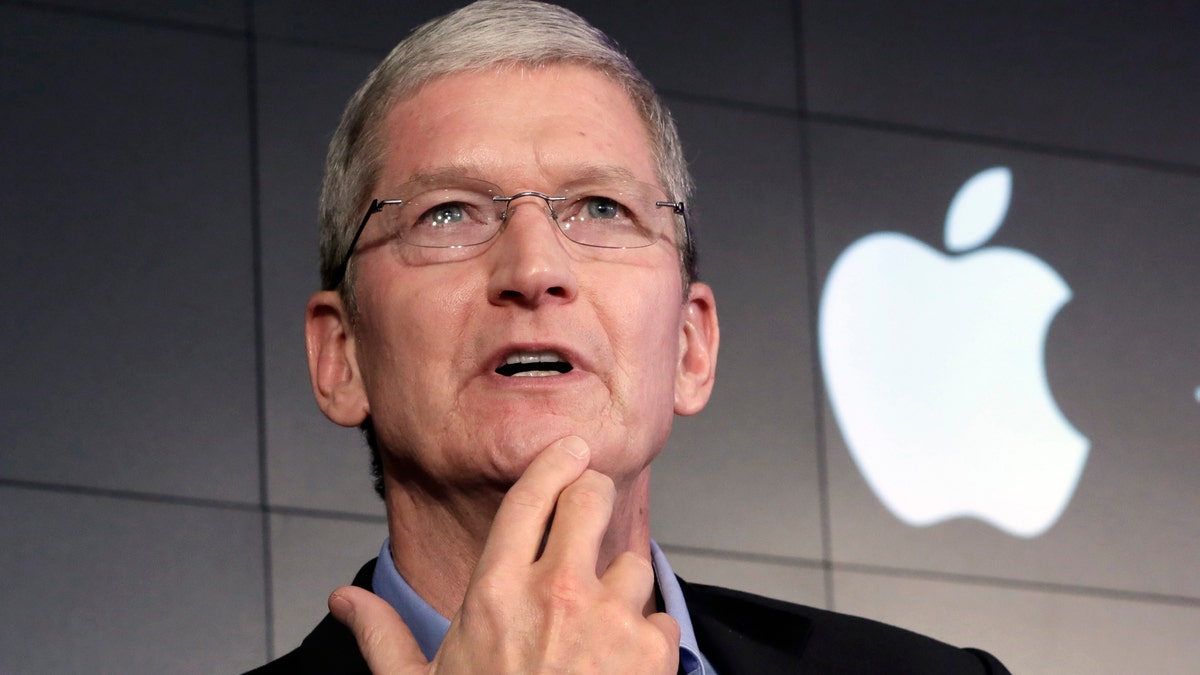
Apple CEO Tim Cook responds to a question during a news conference at IBM Watson headquarters, in New York, Thursday, April 30, 2015. (AP Photo/Richard Drew)
Apple’s decision to fight an order to help hack the phone of a shooter in the deadly terror attack in San Bernardino, Calif., in December adds another twist to the ongoing encryption battle between the tech industry and government.
“The [tech] industry is not known for its courage, but they will really get behind Tim Cook – the whole industry is happy to have Apple be the champion on this,” Roger Kay, president of tech research firm Endpoint Technologies, told FoxNews.com. “Apple and the rest of the tech industry will dig in their heels.”
Jan Dawson, chief analyst at Jackdaw Research, said that Apple’s move will keep the encryption debate in the spotlight. “I think that this case could become the trigger for a bigger discussion around encryption and backdoors, but it’s very hard to tell how it will all go,” he said.
Related: Hollywood hospital hit by ransomware attack, hackers demand $3.6M
Ron Gula, CEO of Tenable Network Security, told FoxNews.com that if Apple is compelled to break its own security protocols it will negatively impact American firms who sell products and services overseas. In particular, data privacy is a major issue for Europe, he noted.
"The perception outside the U.S. is that many U.S.-based companies work closely with the U.S. government to share customer data," Gula explained, via email. "If Apple works or is compelled to work with the U.S. government, it will make it more difficult for U.S. companies to claim that their product or services won’t be exploited by the U.S. government."
The tech giant announced Wednesday that it will fight a federal magistrate's order to help the Obama administration break into an encrypted iPhone belonging to one of the shooters in last December's San Bernardino attack that killed 14 people.
In a statement posted on Apple's website, CEO Tim Cook said the order by U.S. Magistrate Judge Sheri Pym "has implications far beyond the legal case at hand."
Related: Hackers could throw off our power grid by manipulating our AC units
"We have great respect for the professionals at the FBI, and we believe their intentions are good," Cook's statement read in part. "Up to this point, we have done everything that is both within our power and within the law to help them. But now the U.S. government has asked us for something we simply do not have, and something we consider too dangerous to create. They have asked us to build a backdoor to the iPhone."
America’s tech titans have already voiced their concern about creating so-called “backdoors” into encrypted devices for government. In the wake of the Paris terror attacks last November, the Information Technology Industry Council (ITI), which includes Apple, Microsoft, Google, Facebook and Twitter, rejected calls for weakened encryption. “Weakening encryption or creating backdoors to encrypted devices and data for use by the good guys would actually create vulnerabilities to be exploited by the bad guys, which would almost certainly cause serious physical and financial harm across our society and our economy,” it said, in a statement.
In a letter sent to President Obama in July 2015, the ITI also warned officials about the risks that weakening encryption technology would pose to security, commerce and the economy.
Related: Stolen Netflix passwords can be bought for 25 cents on the black market, Symantec warns
Cook's statement Wednesday was published hours after Pym's first-of-its kind ruling, seen as significant victory for the Justice Department in the battle between digital privacy and national security interests.
Endpoint Technologies’ Kay does not expect Apple to seek out any middle ground over the encrypted iPhone. “You will never get Apple to compromise – they are not going to do that,” he said. “What they are going to do is make the government force them – the government will have to decide how far it wants to push.”
Greg Nojeim, director of the Freedom, Security and Technology Project at the Center for Democracy & Technology, applauded Apple’s stance.
Related: Why protecting critical infrastructure from cyberattacks is a global emergency
“The court is ordering Apple to create a backdoor into an iPhone’s operating system, citing a law adopted in 1789,” he said, in a statement. “If the order stands, Apple and other technology companies could be ordered to build backdoors – essentially defects – into other devices, rendering them insecure and vulnerable to attack by law enforcement and by others as well. We will fight against this result.”
However, Jackdaw Research’s Dawson told FoxNews.com that noise from the U.S. tech industry will not influence the row over the encrypted iPhone. “If this was happening as part of the legislative process, then companies could line up alongside Apple and it could arguably make a difference,” he said. “But in this particular situation, the judge will make his decision based on the specific merits of the case.”
Follow James Rogers on Twitter @jamesjrogers
Malia Zimmerman and the Associated Press contributed to this report.




















